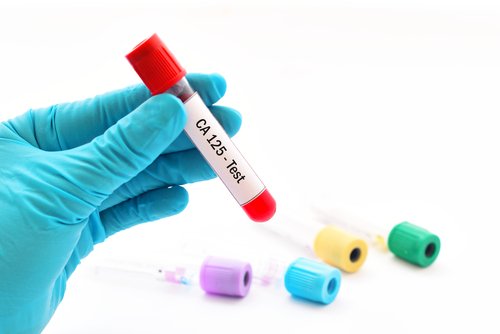The University of Texas’ MD Anderson Cancer Center, in collaboration with the National Cancer Institute and Golfers Against Cancer, is evaluating the usefulness of a blood test called CA-125 at detecting ovarian cancer at early stages in low-risk women.
Cancer antigen 125 (CA-125) is a protein found at higher levels in people with ovarian and other types of cancer. The CA-125 test is frequently used to detect ovarian cancer in women at high risk for the disease, and to monitor treatment response or disease relapse in ovarian cancer patients.
Because high CA-125 levels can be a sign of other conditions besides ovarian cancer, the test is usually not used to screen women at low risk for the disease.
Sponsored by MD Anderson, the CA-125 study (NCT00539162) will assess whether this blood test may be helpful for early detection of ovarian cancer in low-risk women, who would not normally be screened for it.
“Ovarian cancer accounts for more deaths than any other gynecologic cancer,” Daniel Tobias, MD, the medical director of Atlantic Health System’s gynecologic oncology and the principal investigator at Atlantic centers participating in the study, said in a press release.
“If caught early, ovarian cancer has a 90% five-year survival rate, but most cancers aren’t detected early enough,” he added.
The study is recruiting up to 8,000 post-menopausal women, ages 50 to 74, with a low risk of ovarian cancer, at 11 sites across the U.S; more information on contacts and locations can be found here.
Low risk is defined as the absence of several risk factors: a family history of breast or ovarian cancer, carrying certain cancer-related genes, Ashkenazi Jewish ancestry, and a history of breast cancer at age 41 or older, or a history of endometriosis, infertility and/or use of assisted reproduction technology, or use of hormone therapy to treat menopause.
During the study, women are asked to have their blood drawn once a year for at least three years to assess CA-125 levels. If at any point these levels are higher than normal, the test may be repeated after three months or after one and a half months, in combination with a transvaginal ultrasound.
Participants will also answer a questionnaire at the study’s beginning and at each follow-up visit.
“We want to not just encourage women at low risk to participate in this study, but for all women, even those who may be at higher risk, to speak with their [obstetrician/gynecologist] about what types of testing might be appropriate for them,” Tobias said.
“Participating in this study is one of the easiest and most gratifying things that I can do,” said Lee Radsch, a New Jersey participant.
In addition to ovarian cancer tests, it is important that women undergo other cancer tests — including mammograms and colonoscopies — according to recommended guidelines, despite the current COVID-19 pandemic.
“We find it concerning that there has been a dramatic decrease in cancer screening and diagnostic testing across the country since the start of the COVID-19 pandemic,” said Eric Whitman, MD, the medical director of Atlantic Health’s cancer care.
“Diagnoses for cancer dropped more than 46%,” he added, noting that “these delays in identifying cancers will lead to many more diagnoses of less curable late-stage cancer.”

